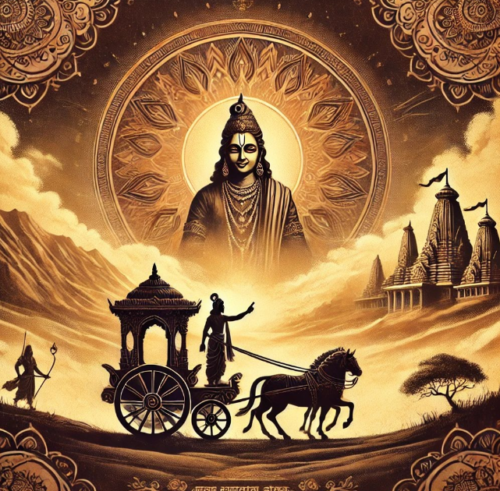The Mahabharata, an ancient Indian epic, offers invaluable lessons on the dangers of corruption and greed and their potential solutions. These teachings remain deeply relevant in today’s world, where ethical leadership, fairness, and self-restraint are crucial for addressing modern challenges. Through its vivid narratives and complex characters, the Mahabharata emphasizes the importance of dharma (righteous duty) and warns against the destructive consequences of unethical behavior.
One of the central figures embodying the pitfalls of greed is Duryodhana, whose unrelenting desire for power leads to widespread destruction. His refusal to share the kingdom with the Pandavas, driven by jealousy and selfishness, exemplifies how unchecked greed can destroy families, communities, and nations. Duryodhana’s envy blinds him to his own strengths, and instead of fostering collaboration, he allows his greed to sow discord. This behavior eventually results in the catastrophic Kurukshetra war, which devastates the entire Kuru dynasty.
Another striking example is Shakuni, the cunning maternal uncle of Duryodhana, whose manipulative actions embody the essence of corruption. Shakuni exploits Duryodhana’s insecurities to fuel hatred against the Pandavas. His role in orchestrating the deceitful dice game that robbed the Pandavas of their kingdom highlights how corruption can infiltrate systems and relationships, causing long-lasting harm. Shakuni’s actions remind us of the dangers of misplaced trust and the catastrophic consequences of unchecked corruption.
On the other hand, characters like Yudhishthira stand as examples of ethical governance and moral integrity. Despite being a victim of treachery during the dice game, Yudhishthira consistently adheres to dharma and values truth and justice above all else. His ability to prioritize the greater good over personal gain illustrates how ethical leadership can create harmony and stability, even in the face of adversity. This stark contrast between Yudhishthira and Duryodhana underscores the importance of self-restraint and fairness in leadership.
In today’s world, the Mahabharata’s lessons on corruption and greed resonate deeply on multiple levels. For instance, corruption in governance often exacerbates economic inequality, where the misuse of resources benefits a select few at the expense of the majority. This is akin to the hoarding and exploitation seen in Duryodhana’s reign. To address this, leaders can draw inspiration from Yudhishthira’s fair and just rule, ensuring equitable distribution of resources and opportunities. Transparency and accountability in governance can help bridge societal divides and foster social inclusion.
The Mahabharata also teaches us about the erosion of public trust due to corruption. Shakuni’s deceitful manipulation of the dice game shattered trust within the royal family, mirroring how corruption erodes faith in modern institutions. Public trust is essential for the smooth functioning of governments, businesses, and communities. By embracing collective accountability, as demonstrated by the Pandavas’ collaborative approach to challenges, societies can rebuild trust and strengthen cooperation. Transparent practices and ethical leadership can restore faith in institutions, leading to better productivity and stronger community bonds.
Unchecked greed and corruption also lead to environmental exploitation, a critical issue today. The Mahabharata emphasizes mindfulness and self-restraint, as seen in Vidura’s wise counsel, which often highlighted the importance of sustainable living and ethical governance. By adopting sustainable practices and prioritizing long-term environmental health, modern societies can mitigate the effects of climate change and ensure the preservation of natural resources. Governments and businesses can learn from these teachings to promote renewable energy, reduce waste, and protect ecosystems for future generations.
Corruption not only disrupts governance but also creates systemic inefficiencies by diverting resources and delaying progress. The Mahabharata’s strategic narratives, such as Krishna’s guidance to the Pandavas, highlight the value of ethical leadership and strategic action. Transparent decision-making in modern contexts can streamline processes and foster innovation, resulting in more efficient systems. For instance, prioritizing merit and ethics in recruitment and project execution can lead to better infrastructure, public services, and economic growth.
Beyond systemic challenges, the Mahabharata’s lessons have direct applications in everyday life. In workplaces, corruption and greed often create toxic environments that lower morale and productivity. Leaders who adopt Krishna’s approach of empowering and guiding their teams can foster a culture of trust and mutual respect. This not only enhances team performance but also reduces workplace conflicts. Similarly, in communities, fostering values of inclusivity and fairness can reduce social discord and create a more harmonious environment.
The Mahabharata also underscores the importance of moral education as a long-term solution to corruption and greed. Incorporating its teachings into school curriculums can instill values like truthfulness, justice, and empathy in younger generations. Education that emphasizes ethical behavior and critical thinking can shape responsible citizens who prioritize integrity over personal gain.
Moreover, the Mahabharata’s advocacy for ethical diplomacy and justice offers lessons for resolving geopolitical conflicts. Much like Krishna’s peace efforts before the Kurukshetra war, which sought to avoid bloodshed through dialogue and fairness, nations today can adopt similar approaches to foster global stability. Diplomatic negotiations based on mutual respect and ethical considerations can prevent conflicts and build lasting peace.
By applying these timeless teachings, societies can address not only corruption and greed but also poverty, inequality, environmental degradation, and systemic inefficiencies. The epic’s wisdom provides a roadmap for creating a world where ethical behavior, fairness, and self-restraint guide personal, organizational, and societal actions.
Ultimately, the Mahabharata reminds us that ethical governance, self-awareness, and strategic thinking are not just idealistic concepts but practical solutions for navigating the complexities of modern life. Its teachings encourage us to create a virtuous cycle of trust, justice, and sustainability, ensuring a prosperous and equitable world for generations to come.
Stay connected with us at www.theknowledgenexus.in for more profound insights, timeless wisdom, and practical lessons
Disclaimer:
The content on this website is intended for informational purposes only, offering insights derived from the Mahabharata, Ramayana, and Bhagavad Gita. Interpretations may vary as these are deeply subjective matters and may be viewed differently across cultures and perspectives.






2 thoughts on “Timeless Lessons and Solutions to Corruption and Greed from the Mahabharata”